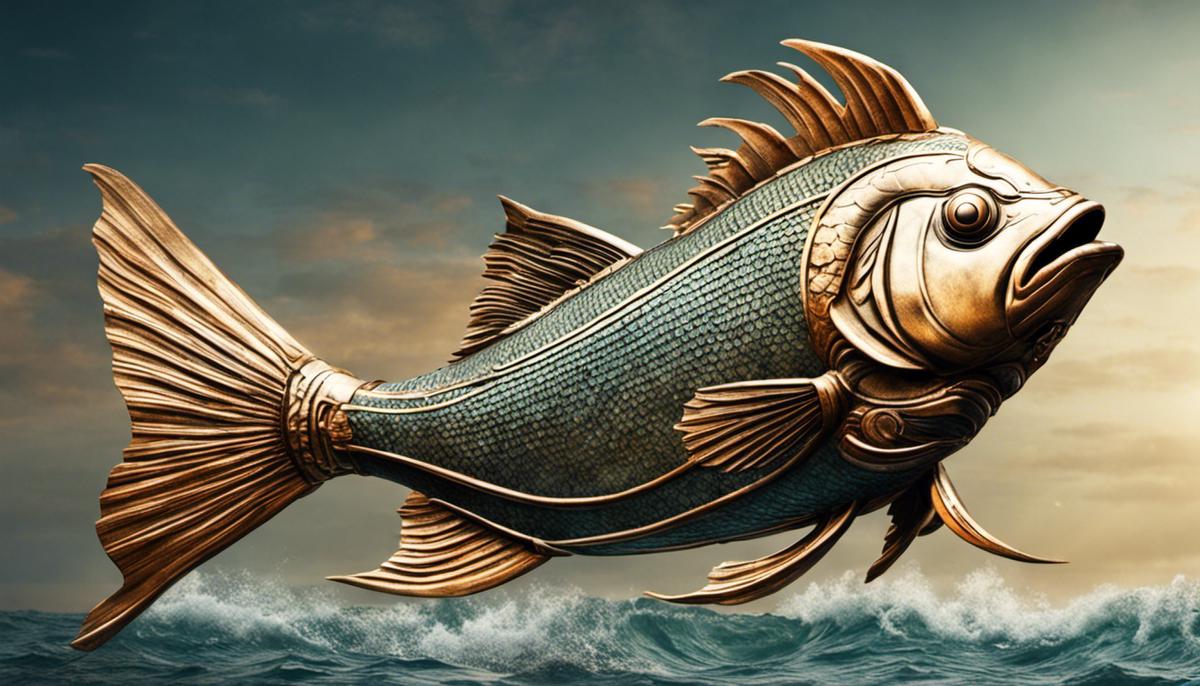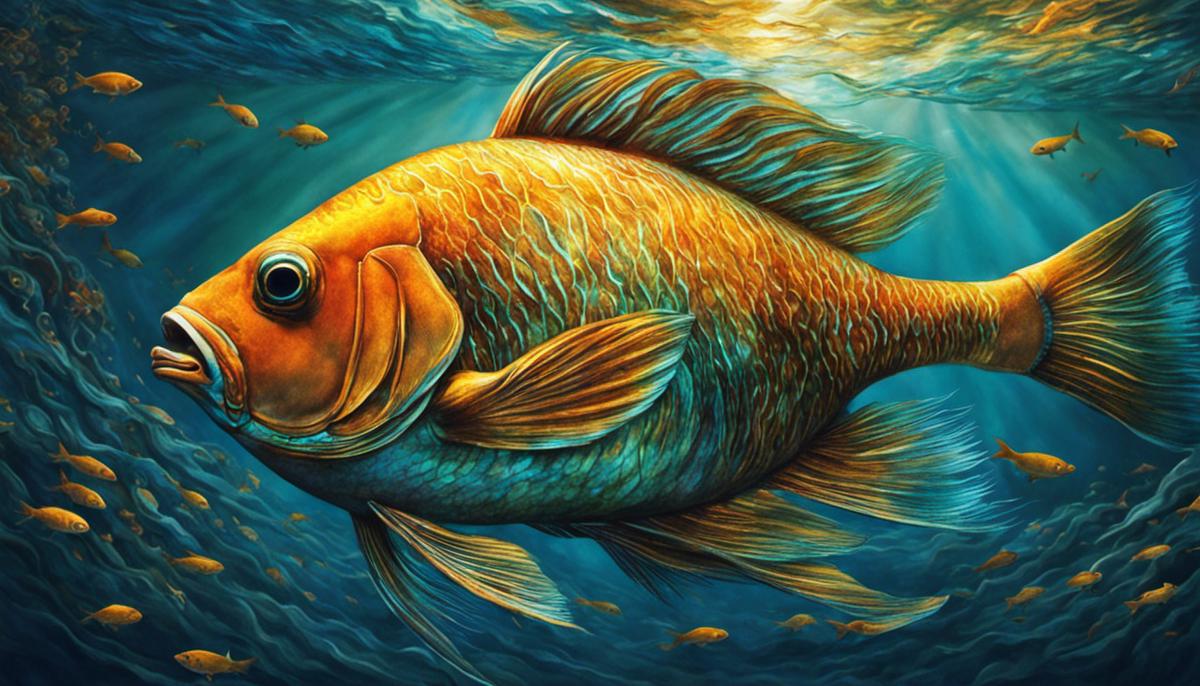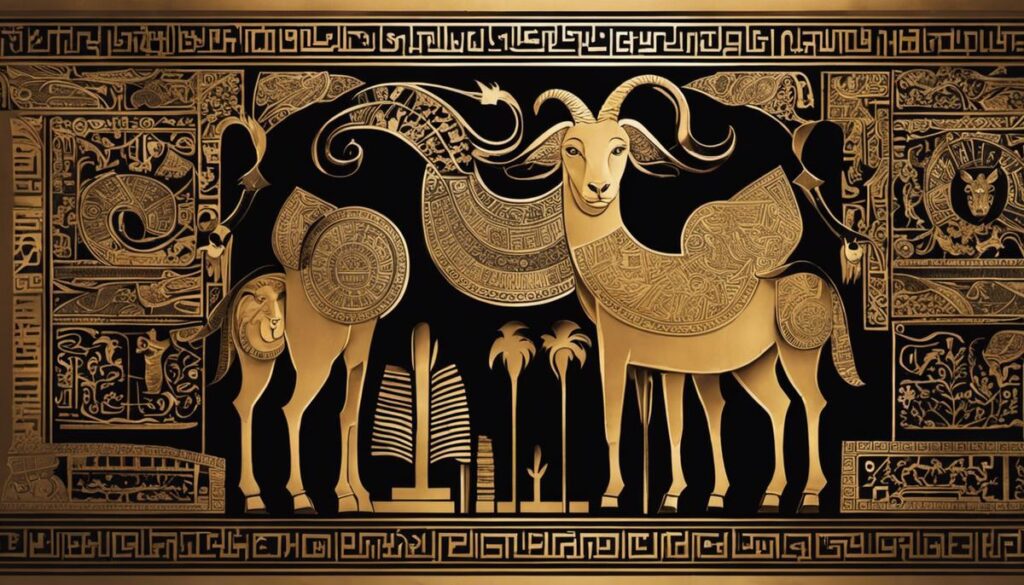The inclusion of fish in numerous biblical passages is a symbolic device etching a profound impact on the narrative fabric of the holy scripture. From depicting the miraculous multiplication of loaves and fishes, to characterizing the evangelical mission of the apostles as “fishers of men,” the use of fish in the Bible resonates within a spectrum of multilayered theological meanings. When we encounter fish in our dreams, these biblical references and their corresponding interpretations can significantly influence our understanding of our unconscious psyche. As we delve into this intricate relationship between fish, dreams, and biblical symbolism, we invite you to embark on a journey of revealing how these aquatic were creatures revered by early Christians and what they represent in our contemporary understanding of biblical themes of faith, abundance, and provision.
The Significance of Fish in the Bible
Delving into Fish Symbols in Biblical Narratives: An Investigation
The vast ocean of biblical symbolism has enriched our understanding of ancient texts, enabling us to interpret parables, metaphors, and analogies with a nuanced perspective. Among these multifarious representations, the fish emerges as a symbol endowed with truly profound connotations. As a symbol, the fish does not swim alone — its rich meanings resonate through many realms of semiotics, including the arenas of art, liturgy, and literature. But in the biblical context, the fish surfaces as a particularly symbolic creature, embodying spiritual, cultural, and mythological depths that warrant unravelling and appreciation.
Primarily, the fish symbol has been accredited with strong associations to Christian themes throughout biblical narratives. Etched in the cornerstone of Christianity is the tale of Jesus Christ feeding thousands with five loaves and two fishes. Scholars argue that this miracle points to abundance and providence. The fish serves as a divine demonstration of the relational dynamics between God and humans. Paradoxically, it highlights God’s ability to provide and mankind’s need to receive, amplifying the echoed call for faith and devotion.
Besides, the symbol of the fish extends to the Jesus ‘fishers of men’ analogy. This metaphor, undeniably, nods to the transformative power of spiritual evangelism and the mandate to spread Christianity’s message. The fish symbolize individuals or groups that are to be caught in the spiritual net of Christianity, underpinning the calling of disciples to engage in the evangelistic mission.
Swimming deeper into symbolic waters, one cannot overlook a key symbol – the Ichthys. Derived from the Ancient Greek word for fish, Ichthys was adapted as an acrostic comprising the initial letters of the Greek phrase ‘Iesous Christos Theou Yios Soter,’ translating into ‘Jesus Christ, Son of God, Savior.’ In this context, the fish symbol hesitates not in enfolding the full essence of Christian theology, attributing saviour qualities to Jesus Christ.
In a more obscure but nonetheless significant vein, biblical fish also gesture towards spiritual transformation. Jonah’s tale of being swallowed by a large fish, only to be spat out three days later, resonates with cyclical themes of sin, repentance, and redemption. Here, the fish becomes the vessel of metaphorical rebirth, reminding us that change is possible even from the depths of despair.
One must acknowledge the dual nature of biblical symbols to do justice to their intricate construction, and the fish flaunts no exception. While it’s largely associated with positivity, the fish may also symbolize more sinister, threatening ideas. These negative connotations can be traced back to Old Testament sarxologies that use marine life metaphors to represent nefarious forces that challenge divine power.
In conclusion, biblical narrative employs the fish as a dynamic symbol, encompassing a plethora of meanings that derivatively speak to the depth and complexity of these religious texts. Ranging from representation of abundance and providence to frames of repentance and rebirth, and even dangers from antagonistic forces, the symbol of fish enriches the tapestry of symbolism, making it an engaging study of symbology, religion, and humanity.

Fish in Dream Interpretation: An Overview
Moving beyond the biblical implications, the symbol of fish in dream interpretation further expands into the realm of psychology and spirituality. Although varying interpretations exist across different cultures and ideologies, the overall consensus suggests fascinating insights into the human psyche.
In the realm of Freudian psychology, dreams with fish involve representations of human instincts and emotions. The fish, a creature of water, may symbolize unconscious thoughts and feelings submerged deep within the mind. These emotions remain hidden, mirroring the way a fish lives beneath the water’s surface—unseen until it decides to breach the surface. In this context, fish appearing in dreams could potentially signify the emergence of repressed feelings or suppressed thoughts, yearning for acknowledgement and emotional processing.
Adhering to Jungian psychology, the fish represents an archetype of transformation and renewal, akin to the biblical narrative of Jonah. It is perceived as a guide towards individuation, the process of understanding oneself better and reconciling with one’s unconsciousness. It beckons towards discovery, self-growth, and transformation, symbolizing an urge for evolutionary development in individual consciousness.
The field of dream interpretation, shrouded in the symbology of various cultures, has widely adopted fish as a symbol of wisdom and knowledge. Dream encounters with serenely swimming fish can suggest a phase of enlightenment, introspection, or profound revelations. It mirrors one’s journey into the depths of their psyche, piercing through the superficial to explore uncharted territories of wisdom and understanding.
In contrast, dreaming of a fish out of water or a dying fish could denote pent up anxiety, unease, or a feeling of emotional misalignment. Here, the fish’s natural environment – water, which symbolizes emotional harmony, is disrupted. It draws parallels with the dreamer’s emotional state, possibly signaling a disruption in the palpable flow of their personal or professional life.
Interestingly, dream interpretation also views fish as a barometer of fertility and abundance. Similar to biblical connotations, a dream with a profusion of fish points towards prosperity, opportunities, and increased productivity. The symbol can also refer to reproduction, indicating a desire for family, children, or specific creative ventures.
Despite these interpretations, it is unequivocally understood that the actual meaning of fish in dreams is profoundly subjective. The context of the dream and the dreamer’s personal relationship with the symbol can significantly deviate from these general interpretations.
Really, the realm of dream interpretation stands as an echo chamber, reverberating with the unseen depths of our unconscious minds. And within this labyrinthine domain, fish swim forward as enigmatic symbols of change, transformation, and profound introspective journeys. It thereby reinforces the intricate relationship between symbolic interpretation and the human psyche’s hidden undercurrents. Through understanding the multitudity of fish symbolism in dreams, we can better comprehend the fascinating array of human thoughts, emotions, and subconscious yearnings.

Biblical Dream Symbols: The Fish
Further extending the dialogue on biblical fish symbolism into the psyche’s shadowy realm of dreams, it is indeed noteworthy to explore the influential perspectives of eminent psychologists such as Sigmund Freud and Carl Gustav Jung. Freudian psychology, focusing on unconscious desires and suppressed memories, can provide an evocative lens for interpreting the fish dream symbolism.
In Freud’s ideation, dreaming of fish could potentially indicate repressed emotions surfacing, aspirations yearning for fulfillment, or entangled inner conflicts finding their expression. While these interpretations are not strictly biblical, they certainly could provide a unique angle of consideration, enhancing our comprehension of the complexity and depth of the fish as a symbolic mechanism in dreams.
Continuing this exploration, Jungian psychological perspectives come to play. Jung differed from Freud by emphasizing the psychological importance of symbology and archetypes. Interestingly, in Jungian psychology, the fish is often viewed as an icon of transformation and renewal. This harmonizes aptly with biblical representation, where we see the story of Jonah and the fish presaging spiritual transformation. Thus, dreaming of fish in this light might suggest an impending or ongoing intimate transformation or evolution on part of the dreamer.
Leaning onto cross-cultural lens, fishes are acknowledged as symbols of wisdom and knowledge in numerous cultures. Such extrapolation could provide a layered understanding of what a dream about fish might mean in the context of an individual’s learning journey or pursuit of enlightenment.
Drawing another thread, when one dreams of a fish out of water or a dying fish, it could denote feelings of anxiety or emotional misalignment. These interpretations, though not traditionally biblical, bear worth in considering how fish dreams may connect to the dreamer’s emotional psyche.
Abundance and fertility are additional key modalities resonating with fish symbolism, echoing biblical notions of providence and bounty. Simultaneously, fish dreams can hint at subjectivity and personal interpretation. An individual’s unique experiences and emotional state can heavily influence their interpretations of dream symbolism, making it a deeply personalized process.
When fish appear as symbols in dreams, they often denote change, transformation, and introspection. They can serve as mysterious prompts for self-examination, pushing individuals to confront and contemplate their internal world. This enigmatic nature of fish symbolism adds to the allure and sanctity of the biblical narrative.
Ultimately, the dreamy realm of fish symbolism and its biblical interpretations offers stimulating insights into human psychology. The interpretive processes involved in dream symbology engage the human psyche in illuminating dialogue with both the conscious and subconscious self. It is within this profound interplay that we continue to explore, preserving the biblical legacy of fish symbolism and its compelling impact on human understanding.

Photo by rachelhisko on Unsplash
Case Studies: The Fish in Biblical Dreams
Although the previous segments have provided coverage of various facets of the fish symbol and its interpretations in biblical narratives as well as in psychological dimensions, it is essential to delve further into subliminal materials and examine recurrent patterns of fish representations in Biblical dreams.
Within the realm of dream interpretation, the fish symbol adopts multi-dimensional and diverse representations, often indicative of evolving states of consciousness. However, through rigorous investigation, a pattern emerges interspersed amidst these diverse representations.
The pertinence of Sigmund Freud’s understanding of fish symbolism in dream interpretation presents itself here, identifying the subjective dream symbolism as latent content transformed into manifest content by dream work mechanisms. Freud postulated that our dreams are repressed wishes, not readily accessible to the conscious mind. Thus, it could be surmised that biblical fish dreams are reflective of one’s deeper wishes and desires, often associated with blessings, prosperity, and/or the yearning for spiritual growth.
Contrarily, Carl Jung’s analysis of dreams, where fish symbolism harks to personal transformation and renewal, espouses the school of thought that dreams depict psychological development, rather than repressed desires. Utilizing Jungian dream analysis, the recurrent pattern of fish symbolism in biblical dreams can be attributed to an innate push for individuation – the process of becoming aware of oneself, integrating the conscious and unconscious mind.
Beyond these subconscious implications, fish, in cultural lexicons, often symbolize wisdom and knowledge. Consequently, dreaming of fish may suggest an objective or quest for wisdom and knowledge, a motif recurrent in the Old Testament and patristic literature.
Significant to note are dreams where fish are represented as out of water or dying, indicative of inner turmoil or conflict, cognitive dissonance or heightened anxiety. Such dreams serve as an internal alarm system, nudging us toward emotional alignment.
Delineating further, the fish symbol has often been associated with abundance and fertility—in numerous cultures and religions, dreams of fish are seen as harbingers of prosperity and productivity.
However, personal interpretation of these symbols remains paramount. Dreams act as unique, subjective experiences cutting across individual consciousness and unconsciousness, irreducibly complex and rife with personal narratives. Circumventing the prescriptive decoding of symbols, the narrative of decoding fish symbol should be treated as a personal, intimate encounter, steeped in subjectivity.
In articulating an understanding of biblical fish dreams, one treads into the realm of introspection. Fish, in this narrative, transmutes into enigmatic symbols of change, transformation, and introspection, inviting individuals to examine their internal landscapes.
There is a profound symbiotic relationship between interpretation of symbolic representation and the human psyche. While the interpretation is an outcome of individual’s mental, emotional and spiritual disposition, the symbols in return influence and shape the psyche.
From Freudian subconscious desires to Jungian individuation, from cultural associations of wisdom to personal narratives of subjectivity, fish symbolism weaves a comprehensive tapestry of human cognition, emotion, and spirituality together. To encapsulate, the recurrent patterns of fish representation in biblical dreams serve as a conduit to understanding the human endeavor towards deeper psychological exploration.

Cultural and Historical Contexts of Fish Dreams
The relationship between cultural and historical context and the interpretation of biblical narratives, including those in dreams, is a compelling topic that has engrossed religious leaders, psychologists, and philosophy scholars alike. Delving into the understanding of how these symbols, specifically the fish, serve as a cultural and spiritual mirror in interpreting dreams, we tread upon the intersection of science, faith, and the human psyche.
First, it is crucial to consider the critical perspective offered by Freudian psychology. In Freud’s viewpoint, a symbol such as fish in dreams often signifies hidden desires or suppressed emotions, based on his theory of dream symbolism revolving mainly around repressed yearnings. Thus, the fish, a notable biblical symbol, might represent an individual’s sublimated aspirations when sighted in dreams.
On the other hand, Jungian psychology offers a contrasting perspective. Carl Jung proposed that symbols in dreams, such as fish, serve as messengers of transformation and renewal. For Jung, dreaming of fish might hint at a moment of significant change or the essential process of individualistic transformation, resonating deeply with the biblical narrative of Jonah’s redemption.
Moving beyond the realm of psychology, cultural factors significantly influence the interpretation of these dreams. Recognized as a symbol of wisdom and knowledge across numerous cultures, spotting a fish in a dream reflects in-depth knowledge or wisdom related to biblical teachings. In other cultures, a fish out of water signifies severe anxiety or emotional distress signifying the individual’s misalignment with their values or path.
Equally noteworthy is the symbolism related to fertility and abundance commonly associated with fish. This association undeniably feeds into interpreting dreams embodying fish: a possible indication of prosperity, fruitfulness, or overwhelming blessings on the horizon.
Of course, personal interpretation and the inherent subjectivity in demystifying dream symbolism can’t be ignored. An individual’s perspective, molded by their unique experiences and personal beliefs, can lead to diverse interpretations of fish symbols in dreams. These symbols can provide profound insights into one’s inner landscape and introspective journey, fostering deeper self-understanding.
Lastly, fish also embody a sense of enigma and allure, which adds another level to the biblical narrative’s interpretation, appealing to our sense of mystery and desire for understanding. This inherent enigma found in fish symbolism can serve as a potent catalyst towards human understanding and exploring the unknown terrain of our psychological landscape.
In conclusion, historical, cultural, and individual factors, along with psychological theories, collectively shape how we interpret biblical symbols such as fish in dreams. This understanding opens avenues to further explore the symbiotic relationship between symbolic interpretation and the human psyche, enriching our understanding of biblical narratives and our innate sense of identity. Whether symbolizing transformation, wisdom, or emotional alignment, fish in biblical dreams serve as a fascinating platform for spiritual, psychological, and cultural exploration.

From a historical perspective, interpreting fish in biblical dreams requires a nuanced understanding of societal norms, shifts in beliefs, and biblical references key to resonating with the ideology of early Christians. Through a collection of case studies pertaining to fish in biblical dreams, we are able to draw patterns and explore potential implications for the dreamer. By looking into the underlining connections between the past and present, societal beliefs, and individual understanding, we collectively paint a more comprehensive picture of the symbolic significance of these fish in dreams. This endeavor reflects our inexhaustible curiosity and continuous strive towards understanding the human psyche – a vast ocean with depths yet unexplored, much like the waters the biblical fish swim in.







